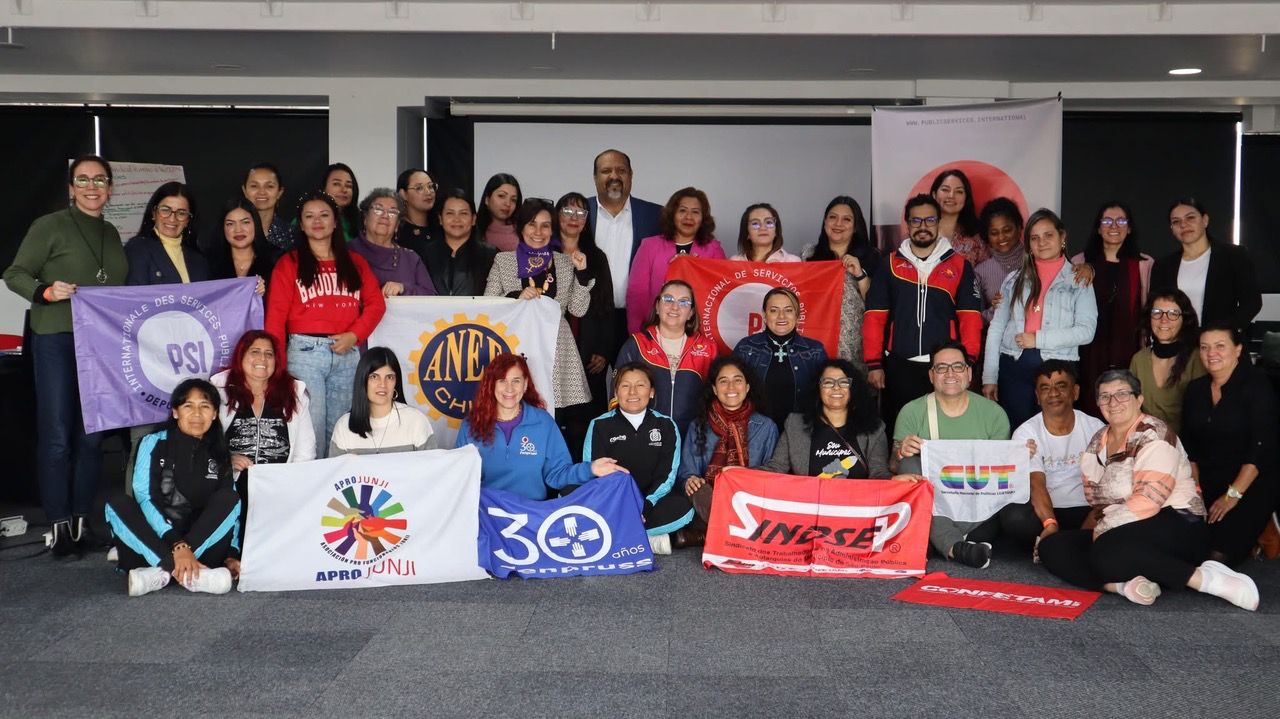
Championing the Human Right to Care in Latin America: We Joined Forces at PSI's Regional Meeting on Childcare in Bogotá
On 28 and 29 July, we joined allied organisations, unions, and public services workers from Latin America and the Caribbean at the Regional Meeting on Childcare: Toward Public Social Care Systems for Early Childhood in Bogotá, Colombia. Convened by Public Services International (PSI) through their FORSA Project, the event marked a significant step in mainstreaming the understanding of care as a public responsibility and a human right in Latin America and the Caribbean.
Reclaiming Care as a Collective Responsibility
The two-day event emphasised the urgent need to strengthen and expand the region's public, universal, and rights-based early childhood care systems. Discussions focused on shared challenges such as privatisation, underfunding, fragmented coverage, and poor working conditions in the care sector, particularly affecting women workers.
Care as a Public Good and a Human Right
Valentina Contreras, our Program Officer on Public Services and Care, opened the meeting's first plenary with a powerful intervention titled "Care and Support: A Social Right and a Public Good". Her presentation laid the conceptual and political groundwork for the event, challenging participants to reimagine care as a human right stemming from the International Covenant on Economic, Social and Cultural Rights, which must be enshrined as a justiciable right, with legal and institutional guarantees ensuring state obligation, regulation, and public provision.
"We are not just talking about services, we are talking about the right to live in dignity." She stated that care is the foundation of life, yet our societies continue to treat it as invisible, unpaid, or outsourced.
She also unpacked how centuries of patriarchal, capitalist, and colonial systems have devalued care work, assigning it disproportionately to women and girls, particularly from marginalised communities. She described how this has led to multidimensional poverty, systemic inequality, and social fragmentation, all exacerbated by austerity policies and market-driven reforms.
"Recognising care and support as rights implies moving beyond charity, voluntarism or temporary policy fixes. It means demanding structural transformation: legal recognition, sustained financing, decent work for caregivers, and universal access to quality care", she said.
She also advanced our perspective on the interconnectedness of care with other fundamental rights, including education, health, decent work, and a healthy environment, demonstrating that it must be treated as a cross-cutting priority in all public policy agendas.
Lessons Learned from Education: Regulating Private Actors and Strengthening Public Funding
Juana Barragán, our Program Officer on the Right to Education, also participated. She delivered a powerful speech highlighting lessons from the education sector relevant to the childcare debate. She warned of the growing privatisation of care and education, which often undermines equity and quality.
"Privatisation replaces the logic of rights with the logic of profit. Whether in education or childcare, this leads to exclusion, poor conditions for workers, and weakened public systems", she explained.
Juana emphasised the importance of strong regulatory frameworks, referencing the Abidjan Principles as a model to ensure private involvement does not erode public education or care. She also advocated for progressive taxation and public investment, noting that rights cannot be guaranteed without sufficient public financing.
She finally shared key takeaways from the Fourth International Conference on Financing for Development, held recently in Seville, critiquing the lack of commitment to financing public services and warning against "false solutions" like public-private partnerships that often shift risk to the public while allowing profits for the private sector.
"We must redirect financial systems toward the common good and resist the capture of public policy by private interests. Only robust public systems can support a true care society", Juana concluded.
Towards a Care Society
With an eye on upcoming policy milestones, including the XVI Regional Conference on Women (ECLAC), the Inter-American Court's forthcoming opinion notification, and global forums like the G20 and World Social Summit, the event concluded with a collectively crafted regional trade union roadmap. The roadmap identified shared demands around decent work, professional recognition, public investment, and democratic governance of care systems. Participants committed to advancing this agenda through cross-sectoral alliances and coordinated advocacy towards a care society.
Some important challenges and opportunities that arose from the meeting were:
- Deeping on the multiple comprehensions of the interlinkages between care and education;
- Foster the inclusion of environmental care and its effects within childcare debates;
- Amplify the scope of the debate by including the participation of broader movements and unusual partners to make substantive societal changes; and,
- Showcase community care experiences to diversify how public services are designed and delivered.
Our participation in this activity was conducted to implement our 2022-2025 Strategic Plan Blueprint, which concerns the regain of public control over the activities and services that enable us to live together in society and the treatment of care as a collective good and a social responsibility.





